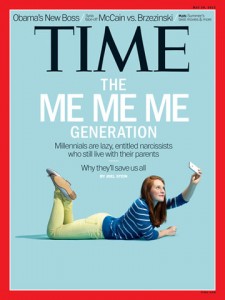 Talking about millenials is a hot topic. Whether it’s how to hire them or ways to work with them, love them, or hate them, analyzing gen Y seems to be an area of continual fascination. And now thanks to Time, this issue is in the spotlight once again with this week’s cover story titled “The Me Me Me Generation,” which features the provocative subtitle “Millennials are lazy, entitled narcissists who still live with their parents. Why they’ll save us all.” As a member of gen Y myself, I was curious to find out what the article, written by Joel Stein, had to say. Although it points out some troubling statistics, overall the verdict was optimistic. Here are three thought-provoking ideas:
Talking about millenials is a hot topic. Whether it’s how to hire them or ways to work with them, love them, or hate them, analyzing gen Y seems to be an area of continual fascination. And now thanks to Time, this issue is in the spotlight once again with this week’s cover story titled “The Me Me Me Generation,” which features the provocative subtitle “Millennials are lazy, entitled narcissists who still live with their parents. Why they’ll save us all.” As a member of gen Y myself, I was curious to find out what the article, written by Joel Stein, had to say. Although it points out some troubling statistics, overall the verdict was optimistic. Here are three thought-provoking ideas:
Gen Y is entitled… and that can be a good thing: The author makes the point that members of gen Y aren’t afraid to reach out to someone a few rungs above them on the career ladder and ask for help — because they feel they deserve it. Whether it’s sending an email to someone in management to ask for mentorship or connecting with an executive on Twitter, millenials aren’t afraid to reach out. Call it entitled if you want, but taking these bold steps can often lead to big rewards. It exemplifies the type of open company culture that gen Y craves. They appreciate accessibility and value companies that operate this way. A senior management team can be respected and provide strong leadership but still be open and willing to help. For example, I feel engaged that the CEO of the company for which I work sends out a personal email describing what he has been doing that week. It makes me feel like I could reach out to anyone in the organization, regardless of their title. This type of transparency helps keep me engaged.
Gen Y will champion diversity: The article pointed out that a major effect of the Internet on millennials is how it has created access to information and opportunity, helping to level the playing field for our generation. In addition, accepting differences of all kinds is also important to gen Y, and it is this openness that will continue to have a positive impact on shaping corporate culture in the future. Not only is a diverse workforce important, but a diversity committee to take on spreading inclusionary initiatives throughout the company is a great example of gen Y pushing to make something they’re passionate about a priority within an organization.
Gen Y is not one-size-fits-all: My generation is the largest age grouping in American history; however, the article makes the point that we may be the last birth grouping that historians will be able to generalize about. This is not only because there are so many different “micro-generations” within gen Y, but also because people are quickly realizing that we’re a generation that can’t be defined by broad stroke stereotypes. It’s tempting, especially in the HR world, to put people into boxes and assume that everyone born during a particular timeframe fits a certain mold, but my generation is demonstrating that way of thinking is simply not effective. While millenials are valued in the company for which I work, it’s not simply because of (or in spite of) the fact that we’re part of gen Y — rather, we’re appreciated because of who we are as individuals. Everyone is encouraged to be innovative and use their unique strengths to contribute to our company’s growth, no matter what generation to which they belong.
With more than 80 million millenials in the United States, I don’t expect this discussion to die down anytime soon. However, I hope that these conversations can stay away from divisive stereotypes while continuing to improve the state of corporate culture as a whole.